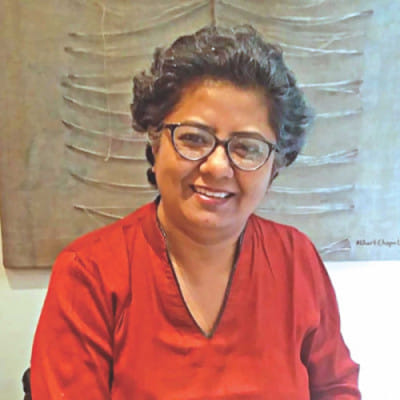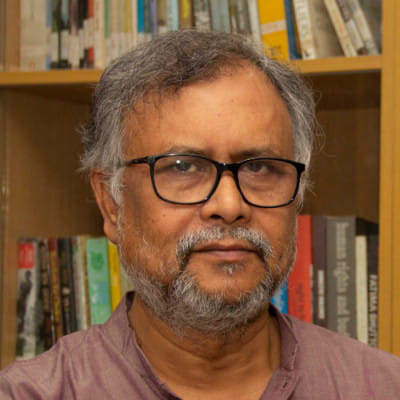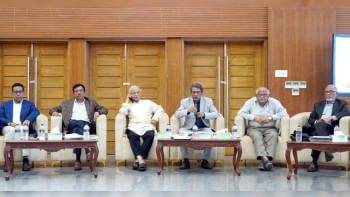The Anti-Discrimination Bill 2022: What experts say
On 5 April 2022, Law Minister Anisul Huq has placed the 'Anti-Discrimination Bill 2022' in the parliament. The Bill is now with the parliamentary committee of the respective ministry for further examination. While placing the Bill, the Minister said that the law is aimed at preventing all forms of discrimination in light of the Constitution. However, the proposed law has already raised several concerns among the members of civil societies and human rights organisations. In this backdrop, four experts of the country have shared their opinion with The Daily Star on various aspects of the Bill.

Dr. Mizanur Rahman
Dr. Mizanur Rahman is a former Professor of Law, University of Dhaka, and the former Chairman, National Human Rights Commission of Bangladesh.
The National Human Rights Commission, along with the Law Commission of Bangladesh as well as the civil society organisations have wanted, for a long time, for there to be an anti-discrimination legislation. However, the draft Bill does not incorporate the aspect of making discrimination a punishable offence – punishment is very loosely defined and only monetary penalty has been included. This Bill can be called an example of "bureaucratisation" of law – the law will merely create an avenue for bureaucrats to reap allowances while discrimination and discriminatory attitudes are far from removed. We, the common people, are the owners of the republic – but this spirit is completely absent from the law. The law creates several tiers of the monitoring bodies without any clear indication as to why these committees are needed. This law should automatically have come under the jurisdiction of the NHRC, and if the NHRC had the necessary political will, the law could have been a very strong tool in tackling discrimination. During my tenure as the chairman of NHRC, we had prepared a draft Anti-Discrimination Bill which had the assent of the chairman of the Law Commission, but that has been discarded and the provision on discrimination being a punishable offence has been scrapped from the present draft. Without such provision, the law becomes merely a document of morality – only to raise awareness cannot be the objective of the law; the law must ensure that a wrong is punished. The law does not provide the aggrieved person to go directly before the court, but directs them to the bureaucrats. Many marginalised groups do not have the ability to approach the implementing bodies and go through their steps. The law is degrading, insulting and humiliating for a dignified citizen of this independent nation.
One of the main forms of discrimination that we expected the anti-discrimination law to tackle is discrimination based on religious identities. This however is not adequately addressed in the present form of the bill. Section 3(Cha) is a very constricted provision. For example, not receiving equal employment opportunities, being denied services, being subject to hate speech and racial slurs are only a few of the many ways in which religious minorities face discrimination. Blatant discrimination in the form of untouchability is still widespread in the society but these are not punishable under the present law. This law is not people-friendly, poor-friendly, women-friendly, marginalised-friendly, or even child-friendly, it is only rich-friendly and power-friendly.

Dr. Faustina Pereira
Dr. Faustina Pereira is Professor, General Education in Law, and Senior Fellow, Centre for Peace and Justice, BRAC University.
An overarching feature of the draft Anti-Discrimination Bill is that it is reactive, and not proactive or reflective. It comes into effect once a discrimination has already occurred, but it does not sufficiently touch upon the root causes of discrimination or its prevention. It also does not take into account the possibility that discrimination can take place simultaneously across intersections of identities such as race, gender, class, religion, occupation or political belief, and thereby offers a narrow, linear and formalistic approach to discrimination. This narrow outlook in turn fails to encompass the multi-dimensionality of discrimination widespread in the society – for example, discrimination on the basis of age, or of marital status, or on the basis of pregnancy, such as termination from employment due to pregnancy. Many such kinds of discrimination commonly occur in workplaces, but have not been adequately covered in the draft law. Again, discrimination can be committed against individuals with certain non-communicable diseases. These aspects are absent from the law. Furthermore, the law neither recognises deeper issues of restitution, reconciliation and healing; nor does it provide for (re)integration of vulnerable groups into society. Addressing and eliminating discrimination cannot only be limited to responding to a complaint of discrimination; rather, the aggrieved person or the aggrieved community or institution must be provided a holistic remedy.
Moreover, this draft is silent on the point of intra-religious discrimination. While people are more familiar with incidents of discrimination against members of other religions, discrimination can be committed upon members of the same religion or religious community, such as, against adherents of different sects within the larger religious identity. Again, the law would need to protect those who do not subscribe to any particular religious belief system. These groups too have been overlooked in the draft Bill. Such inclusive perspectives would be a good reflection of the spirit of Article 11 of the Bangladesh Constitution which outlines the state's protection of human rights and democracy and guarantees the dignity and worth of the human person. It could also be an exercise in an analogous reading of Articles 2A, 12 and 41 alongside Articles 26, 27, 28 and 29.
The structure of the monitoring committee shows that high-level government representatives will sit in the committee – it is not clear why that is the case. Moreover, various marginalised stakeholder groups and women have been offered merely top-down, tokenistic representation, which is unfortunate. This effectively leaves out the voices of those in whose name this law is to be passed.
Ultimately, political will shall be the driving force behind whether and how well this law serves its stated purpose.

Zakir Hossain
Zakir Hossain is the Chief Executive, Nagorik Uddyog (Citizen's Initiative)
The title of the law gives a fair notice about the purpose of the law. In this case the word "Anti-discrimination" fails to justify the social conditions. Moreover, it gives an idea that discrimination may exist in any ideal society. In this context, I would like to propose that the title should be "The Elimination and Abolition of Discrimination Act" as it accepts the fact that the discrimination is prevailing in the society and the idea of this law is to end that in all forms.
Gender based discrimination is prohibited under the Constitution of Bangladesh. But religion-based personal laws set discrimination in respect of choice regarding marriage, rights within marriage and on its dissolution and inheritance. Such personal laws also trap women in abusive marital life since there is no clean exit from this extreme abuse. The proposed law makes discriminatory treatment due to divorce, widow or marital relationship unlawful; but is mostly silent about discriminatory provisions of personal laws regarding inheritance and marriage.
Section 3 of the proposed law recognises the discrimination against third gender people. However, human rights activists have been raising objections against the terminology as it excludes other sexual minorities or orientations. I think, using 'hijra' and 'transgender' will be more inclusive instead of using 'third gender'. The law does not recognise the sexually diversified communities which ultimately weakens the broad purpose of the law.
In recent days, Bangladesh has been experiencing increasing rise in intolerance against the minorities and liberal groups. Social media has also become a tool of oppression against them. Lately, we have seen an alarming number of violence against minorities using digital platforms. Though the proposed law recognises several acts as discriminatory it does not address the issue of hate speech on social media and online platforms.
The section 3 (cha) identifies restrictions to enter any religious place or to organise or to participate in any religious festival as discriminatory act. However, the proposed law does not speak the volume of violence against religious institutions we witness regularly in our country. The remedial measures under this law are not satisfactory too. It is very preventive in nature rather than being protective.
Moreover, one cannot identify this law as enough gender sensitive. As a signatory of the CEDAW, which the country ratified in 1984 (with specific reservations); Bangladesh has obligation to end discrimination against women. Surprisingly, the Statement of Purposes and Reasons (uddessho o karon shongbolito bibriti) of the Bill mentions UDHR, ICCPR, ICESCR, ICERD, but not CEDAW. CSOs and human rights activists have been questioning the validity of such reservations under CEDAW in the name of personal laws. Not only CEDAW, but also ILO Convention No. 169 and other relevant conventions should be added in the Statement and the proposed law should clearly reflect the philosophy of these Conventions.

Nina Goswami
Nina Goswami is the Director-Programme, Ain o Salish Kendra (ASK), and an Advocate, Supreme Court of Bangladesh.
The draft law appears to have been only prepared to fulfill the state's prior commitments to enact an anti-discrimination law, but there is clear lack of thought behind making the law effective. Firstly, this law does not clearly stipulate whether discrimination is a criminal offence. Secondly, it creates several tiers which an aggrieved person has to go through, in order to obtain remedy, such as district, divisional and national forums. There is also a lack of clarity as to which court should be approached and what the penalty will be If the order or verdict is disobeyed by any person. It is not clear why a separate monitoring committee would be formed instead of utilising and strengthening the National Human Rights Commission. It is clear that the law will not be effective in providing any remedy to those who face discrimination. The law repeatedly refers to the formulation of rules for implementation of laws – rules can be passed by the concerned ministry without inputs from relevant stakeholders.
The law does not fully capture the complexities of group identities and how discrimination may be committed against groups. Discrimination can take place in numerous forms; for example, a parent may give away a child because it is born as a hermaphrodite, which will result in the child being deprived of an upbringing, an education, and other rights. The law should be open to addressing discrimination committed against any individual based on different aspects of their identity. Many of such vulnerable groups have not been brought within the ambit of the law, and as it currently stands, the existence of these aspects of their identities are being denied. Section 3(Dha) states that no one shall obstruct the transfer or obtaining property "as per" law; this is very problematic as the law itself is discriminatory and reinforcement of such discriminatory succession practices is inconsistent with the spirit of an anti-discrimination legislation.
As far as our international commitments are concerned, we have retained reservations on provisions which guarantee equal inheritance and guardianship rights for women. Therefore, these aspects have been left out from the draft law.
Overall, the fact that the government has undertaken an initiative to pass an anti-discrimination law is appreciable. However, the spirit of the draft is not what we had aspired for.

 For all latest news, follow The Daily Star's Google News channel.
For all latest news, follow The Daily Star's Google News channel. 



Comments